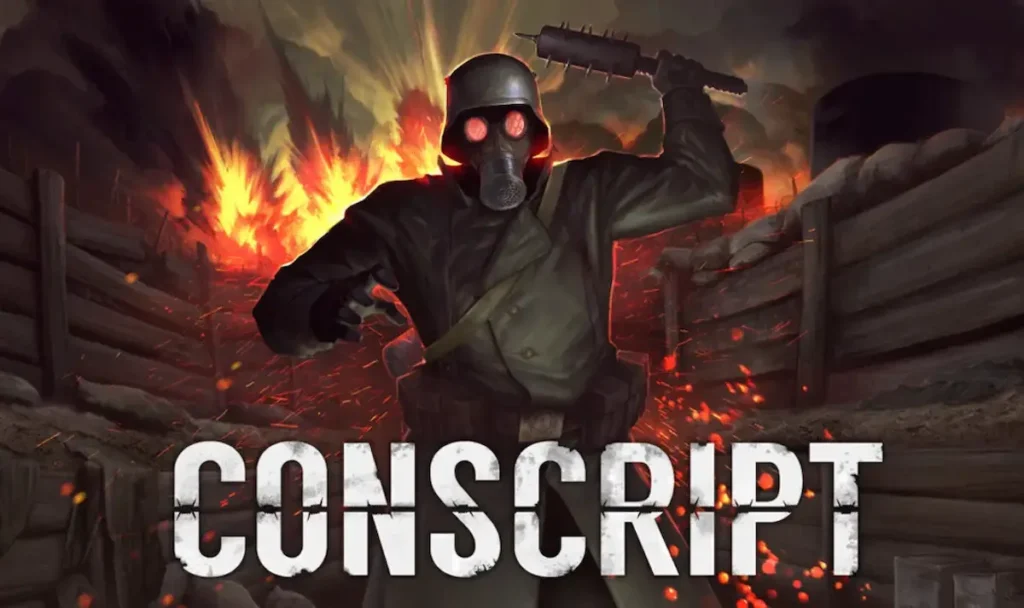There was a time when survival horror needed monsters. Whether it was hordes of shambling zombies, packs of mutated canines, or swarms of screeching, flying lizards, these extraordinary creatures defined the mood in landmark examples of the genre.
But Conscript, Jordan Mochi’s top-down homage to Resident Evil, does not rely on supernatural threats. Instead, it draws on the brutality and madness of the First World War’s longest and most senseless battle: Verdum.
In 1916, the story follows Andre, a teenager from provincial France, who is sent to Verdum with his brother, Pierre. The battle, started by the Germans to serve as a meat grinder for the local resistance, has become a never-ending nightmare.
Soldiers, suffering from starvation and lack of sleep, crouch down in fear in trenches, surrounded by the bodies of their dead comrades. Andre, who has promised his sick mother to keep Pierre safe, faces a terrible situation when his wounded brother is captured during the latest German offensive.
The quest to rescue Pierre initiates a series of ordeals that embody the essence of old-school survival horror, intensified by the grim reality that nothing Andre witnesses would be out of place in a history book.
Conscript comply closely to the classic survival horror blueprint. Each area, from the winding corridors of a battered French fort to the burning ruins of a bombarded village, is a maze of interconnected hubs of carnage, punctuated by sanctuaries where you can store items and upgrade your equipment.
Simple lock puzzles block progress until you gather the important keys or information to guess a combination code, granting access to new rooms or life-saving shortcuts.
Essential resources like ammo, medical supplies, and even the ability to save your progress are finite, forcing players into the familiar mess of whether to save now or risk pushing forward.
Battle in Conscript includes some modern concessions, such as extra damage to unaware enemies and a dodge roll with invulnerability frames. But the combat remains intentionally clumsy and slow, showing the mindset of scared draftees reluctantly locked in an endless cycle of violence.
Aiming takes ages, leaving you immobile and weak. Mud puddles obstruct movement, barbed wires fences, and clouds of phosgene gas cause injuries, and reloading while an enemy charges at you is a risky endeavor.
Enemies in Conscript come in various forms, including rifle-carrying Germans, bayonet-swinging Germans, short Germans with clubs, massive armored Germans with hatchets, German officers with rapiers, and trench coat-wearing German with flamethrowers.
Despite featuring only two enemy species- the Germans and rats that feast on corpses- the game maintains a surprising range of enemy types, making sure it never feels monotonous, even over roughly 20 hours of gameplay.
Mochi’s commitment to historical accuracy puts a layer of authenticity to Conscript, making it stand out among more traditionally-themed survival horror games. This authenticity increases the game’s harsh moos, with every aspect thoroughly crafted to convey the absurdity and depravity of war.
The palette, consisting almost entirely of sickly browns and drab grays, offers no glimpse of hope in the disintegrating world. Backdrops feature images of death and decay: piling corpses, ruined churches, and withering orchards.
The soundscape is equally distressing, with simple effects like booted feet on gravel and rusty metal on fragile German craniums suggesting a sense of paranoid isolation. Ambient noises of artillery barrages, the screams of the wounded, and ominous synth further alienate players from any show of humanity.
Conclusion
This unity of purpose, the determination to heroically portray the horrors of war, is a proof in every detail of Conscript. From the inspirational-yet-morbid propaganda posters on walls to tranquil interludes juxtaposing Andre’s farm life with his current plight, Mochi shows rare empathy for all sides.
He shows the Germans as pathetic shell-shock victims, not so different from Andre’s comrades, questioning the morality imposed by the conditions of war itself.
Mechanical touches, like being shot by your own officer for retreating, blur the lines of right and wrong further. There is no sense of triumph when the final battle is won in Conscript.
Also read: Darkest Dungeon 2 Review: A fast-Paced with Menacing Vibe

